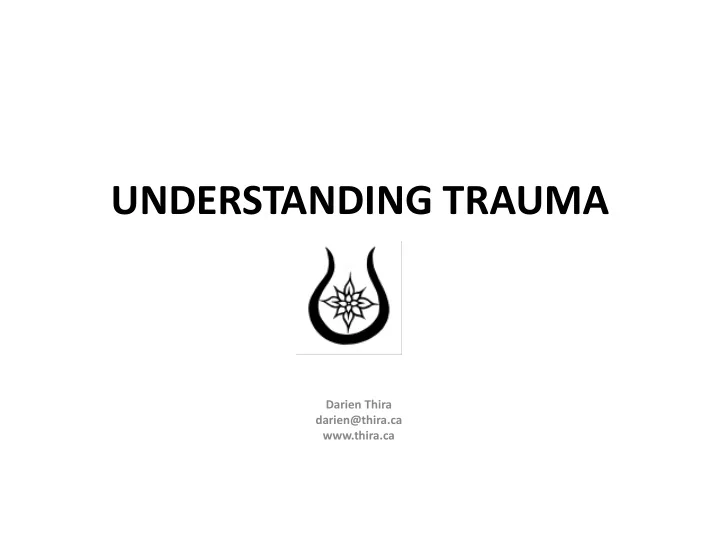

UNDERSTANDING TRAUMA Darien Thira darien@thira.ca www.thira.ca
THE ROOT OF TRAUMA COLONIZATION Relocation and Reserves Criminalization of Culture and Theft of Rights Indian Residential School Social Services COMMUNITY TRAUMA FAMILY TRAUMA PERSONAL TRAUMA
POST TRAUMATIC STRESS DISORDER SYMPTOM CLUSTERS • Re-experiencing - nightmares, intrusive thoughts, “flashbacks” • Avoiding - avoiding anything related to the trauma, places, people, and activities that remind them of what happened to them, and supressing feelings or thoughts about the trauma • Heightened Arousal - heightened physiological arousal and increased reactivity to stress and trauma. May be jittery and are startled easily. They often have problems with concentration because they’re constantly alert and looking for danger. Hyperarousal often leads to irritability and trouble sleeping. • Changes in thoughts, feelings and beliefs -feeling sad, anxious, or afraid most of the time, becoming emotionally numb, losing interest in activities and relationships, thinking of themselves as a bad or guilty person, believing that the world is a scary, dangerous place and people can’t be trusted
TRAUMA & THE NERVOUS SYSTEM Conserving (Shut Down) ( DVC ) Escalated (“Anxiety”) (“Depression”) (Rage) (Flight) (Freeze) (Fight) SNS PNS Reacting Relaxed/ (Alert) (Relaxed) (Social) ( VVC )
TRAUMA AS A TORNADO
TRAUMA BRAID Traumatic Event Instinct FLIGHT FREEZE FIGHT ↓ ↓ ↓ Trauma “ANXIETY” “DEPRESSION” “RAGE” ↓ ↓ ↓ Colonization “ADDICTION” SUICIDE VIOLENCE
3 Ways PTSD Affects the Brain • The threat perception system is enhanced – brain becomes a fear driven brain • The ability to distinguish between what stimuli is relevant and what can be dismissed is challenged • The self sensing part of the brain becomes blunted
Trauma - Brain Changes Normal Function Post Traumatic Stress Disorder Amygdala Sets off fight or flight in Sets off fight or flight in response to danger response to memories or thoughts about danger Hippocampus Transfers and stores Stores memories information into memories incorrectly and affects memory retrieval Prefrontal cortex Complex thinking, decision Dysfunctional thought making and appropriate processes and decision behavior making; inappropriate responses to situations Hypothalamus-pituitary- Releases hormones like Overactive, which leads to adrenal (HPA) axis cortisol to help manage imbalances in hormone and direct efforts to levels and increases stress stressor and anxiety
TRAUMA IMPACTS FOCUS IMPACTS EMOTIONAL Affect Dysregulation Suppression Relational Ambivalence/Instability MENTAL Black and White Thinking Idealize or Demonize Others Poor Problem Solving Personalization PHYSICAL Self Mutilation “Addictive” Behaviours Somatic Complaints SPIRITUAL Dissociation Shame Disconnection from Spirit/Cultural Tradition
INDIVIDUAL AND COMMUNITY TRAUMA • Intergenerational Trauma – How does it happen? • Direct (learned) • Indirect (environment) • Epigenetic (“blood memory”)
Key Points In Working with Trauma • Hold the perspective that we have an innate capacity to heal and transform trauma; given the right environment our systems can find their way back home. • Creating a felt sense of SAFETY and connection is essential. You must become a “safe haven”. • Work with building resources and strengths. Highlight strengths already present – Wellness Model • Trauma impacts the physiology, therefore it is necessary to include working SOMATICALLY (with the body) in the healing of trauma.
“Trauma can be hell on earth, but when transformed, it is a divine gift.” ~ Dr. Peter Levine
Recommend
More recommend